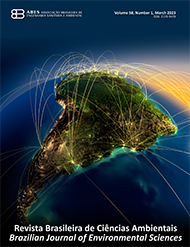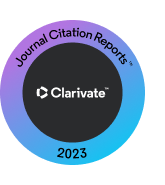Microplastics in Brazilian coastal environments: a systematic review
DOI:
https://doi.org/10.5327/Z2176-94781719Keywords:
microplastics; coastal ecosystems; beaches; mangrove; estuaries; environmental monitoring.Abstract
This systematic review aimed to evaluate the current scenario of research on microplastics (MPs) in Brazilian coastal environments, considering beaches and also environments not yet reported in previous reviews, such as estuaries, mangroves, and reefs. Five databases were consulted, and 102 articles on the subject published between 2018 and 2023 were selected. The universities and research institutions that most published in this period were from the Southeast region (37.3% of the articles), followed by the Northeast region (34.3%). Universities in the states of Rio de Janeiro (15.7%) and Pernambuco (15.7%) lead the number of publications, followed by São Paulo (11.8%), Rio Grande do Sul (11.8%), and Espírito Santo (7.8%). About the coastal environments studied, 70% of the studies evaluated the presence of MPs on beaches, 26% on mangroves, 2% on estuaries, and 2% on coral reefs. Studies that evaluated its presence in marine biota corresponded to 43% of the articles, sediment (42%), and water (14%). The most studied organisms were bony fish (42%), bivalves (17%), crustaceans (7%), seabirds (7%), turtles (7%), and microfauna (5%). Despite growing, the distribution of study locations is still uneven and not related to the length of the coastline of each state. As for the origin, the works compiled in this study infer that the main sources of PMs are tourism, fishing, and river discharge, while the action of waves and winds contributes to the dispersion of these particles to less urbanized beaches and remote locations.
Downloads
References
Akkajit, P.; Tipmanee, D.; Cherdsukjai, P.; Suteerasak, T.; Thongnonghin, S., 2021. Occurrence and distribution of microplastics in beach sediments along Phuket coastline. Marine Pollution Bulletin, v. 169, 112496. https://doi.org/10.1016/j.marpolbul.2021.112496
Alvarez-Zeferino, J.C.; Ojeda-Benítez, S.; Cruz-Salas, A.A.; Martínez-Salvador, C.; Vázquez Morillas, A., 2020. Dataset of quantification and classification of microplastics in Mexican sandy beaches. Data in Brief, v. 33, 106473. https://doi.org/10.1016/j.dib.2020.106473
Alves, F.L.; Pinheiro, L.M.; Bueno, C.; Agostini, V.O.; Perez, L.; Fernandes, E.H.L.; Weschenfelder, J.; Leonhardt, A.; Domingues, M.; Pinho, G.L.L.; García-Rodríguez, F., 2023. The use of microplastics as a reliable chronological marker of the Anthropocene onset in Southeastern South America. Science of the Total Environment, v. 857, (2023), 159633. https://doi.org/10.1016/j.scitotenv.2022.159633
Anbumani, S.; Kakkar, P., 2018. Ecotoxicological effects of microplastics on biota: a review. Environmental Science and Pollution Research, v. 25, 14373-14396 https://doi.org/10.1007/s11356-018-1999-x
Andrady, A.L., 2011. Microplastics in the marine environment. Marine Pollution Bulletin, v. 62, (8), 1596-1605. https://doi.org/10.1016/j.marpolbul.2011.05.030
Auta, H.S.; Emenike, C.U.; Fauziah, S.H., 2017. Distribution and importance of microplastics in the marine environment: a review of the sources, fate, effects, and potential solutions. Environmental International, v. 102, 165-176. https://doi.org/10.1016/j.envint.2017.02.013
Barnes, D.K.A.; Galgani, F.; Thompson, R.; Barlaz, M., 2009. Accumulation and fragmentation of plastic debris in global environments. Philisophical Transactions of the Royal Society B, v. 364, (1526), 1985-1998. https://doi.org/10.1098/rstb.2008.0205
Bom, F.C.; Sá, F., 2022. Are bivalves a source of microplastics for humans? A case study in the Brazilian markets. Marine Pollution Bulletin, v. 181, 113823. https://doi.org/10.1016/j.marpolbul.2022.113823
Brasil, 2019. Ministério do Meio Ambiente. Agenda Nacional de Qualidade Ambiental Urbana. Plano Nacional de Combate ao Lixo no Mar, 1–40 (Accessed November 05, 2024) at:. http://www.mma.gov.br/publicações
Brasil, 2022. Instituto Nacional de Estudos e Pesquisas Educacionais Anísio Teixeira. Estatísticas Censo da Educação Superior (Accessed November 05, 2024) at:. https://www.gov.br/inep/pt-br/acesso-a-informacao/dados-abertos/inep-data/estatisticas-censo-da-educacao-superior.
Carretero, O.; Gago, J.; Viñas, L., 2021. From the coast to the shelf: microplastics in Rías Baixas and Miño River shelf sediments (NW Spain). Marine Pollution Bulletin, v. 162, 111814. https://doi.org/10.1016/j.marpolbul.2020.111814
Carvalho, J.P.S.; Silva, T.S.; Costa, M.F., 2021. Distribution, characteristics and short-term variability of microplastics in beach sediment of Fernando de Noronha Archipelago, Brazil. Marine Pollution Bulletin, v. 166, 112212. https://doi.org/10.1016/j.marpolbul.2021.112212
Castro, R.O.; Silva, M.L.; Araújo, F.V., 2018. Review on microplastic studies in Brazilian aquatic ecosystems. Ocean and Coastal Management, v. 165, 385-400. https://doi.org/10.1016/j.ocecoaman.2018.09.013
Celis-Hernández, O.; Ávila, E.; Ward, R.D.; Rodríguez-Santiago, M.A.; Aguirre-Téllez, J.A., 2021. Microplastic distribution in urban vs pristine mangroves: using marine sponges as bioindicators of environmental pollution. Environmental Pollution, v. 284, 117391. https://doi.org/10.1016/j.envpol.2021.117391
Cole, M.; Lindeque, P.; Fileman, E.; Halsband, C.; Goodhead, R.; Moger, J.; Galloway, T.S., 2013. Microplastic ingestion by zooplankton. Environmental Science & Technology, v. 47, (12), 6646-6655. https://doi.org/10.1021/es400663f
Cruz, A.C.F.; Gusso-Choueri, P.; Araujo, G.S.; Campos, B.G.; Abessa, D.M.S., 2019. Levels of metals and toxicity in sediments from a Ramsar site influenced by former mining activities. Ecotoxicology and Environmental Safety, v. 11, 162-172. https://doi.org/10.1016/j.ecoenv.2018.12.088
Defontaine, S.; Sous, D.; Tesan, J.; Monperrus, M.; Lenoble, V.; Lanceleur, L., 2020. Microplastics in a salt-wedge estuary: vertical structure and tidal dynamics. Marine Pollution Bulletin, v. 160, 111688. https://doi.org/10.1016/j.marpolbul.2020.111688
Deng, J.; Guo, P.; Zhang, X.; Su, H.; Zhang, Y.; Wu, Y.; Li, Y., 2020. Microplastics and accumulated heavy metals in restored mangrove wetland surface sediments at Jinjiang Estuary (Fujian, China). Marine Pollution Bulletin, v. 159, 111482. https://doi.org/10.1016/j.marpolbul. 2020.111482
Drabinski, T.L.; Machado, W.T.V.; Fonseca, E.M.; Carvalho, D.G.; Gaylarde, C.C.; Lourenço, M.F.P.; Silva, A.L.C.; Baptista Neto, J.A., 2023. Microplastics in freshwater river in Rio de Janeiro and its role as a source of microplastic pollution in Guanabara Bay, SE Brazil. Micro, 3, 208-223. https://doi.org/10.3390/micro3010015
Fernandes, A.N.; Bertoldi, C.; Lara, L.Z.; Stival, J.; Alves, N.M.; Cabrera, P.M.; Grassi, M.T., 2022. Microplastics in Latin America ecosystems: a critical review of the current stage and research needs. Journal of the Brazilian Chemical Society, v. 33, (4), 303-326. https://dx.doi.org/10.21577/0103-5053.20220018
Ferreira, G.V.B.; Barletta, M.; Lima, A.R.A.; Morley, S.A.; Costa, M.F., 2019. Dynamics of marine debris ingestion by profitable fishes along the estuarine ecocline. Scientific Reports, v. 9, 13514. https://doi.org/10.1038/s41598-019-49992-3
Ferreira, G.V.B.; Justino, A.K.S.; Eduardo, L.N.; Lenoble, V.; Fauvelle, V.; Schmidt, N.; Junior, T.V.; Frédou, T.; Lucena-Frédou, F., 2022. Plastic in the inferno: microplastic contamination in deep-sea cephalopods (Vampyroteuthis infernalis and Abralia veranyi) from the southwestern Atlantic. Marine Pollution Bulletin, v. 174, 113309. https://doi.org/10.1016/j.marpolbul.2021.113309
Ferreira, G.V.B.; Justino, A.K.S.; Eduardo, L.N.; Schmidt, N.; Martins, J.R.; Ménard, F.; Fauvelle, V.; Mincarone, M.M.; Lucena-Frédou, F., 2023. Influencing factors for microplastic intake in abundant deep-sea lantern fishes (Myctophidae). Science of The Total Environment, v. 867, 161478. https://doi.org/10.1016/j.scitotenv.2023.161478
Ferreira, P.; Fonte, E.; Soares, M.E.; Carvalho, F.; Guilhermino, L., 2016. Effects of multi-stressors on juveniles of the marine fish Pomatoschistus microps: gold nanoparticles, microplastics and temperature. Aquatic Toxicology, v. 170, 89-103. https://doi.org/10.1016/j.aquatox.2015.11.011
Fossi, M.C.; Marsili, L.; Baini, M.; Giannetti, M.; Coppola, D.; Guarranti, C.; Caliani, I.; Minutoli, R.; Lauriano, G.; Finoia, M.G.; Rubegni, F.; Panigada, S.; Bérubé, M.; Ramirez, J.U.; Panti, C., 2016. Fin whales and microplastics: the Mediterranean Sea and the sea of Cortez scenarios. Environmental Pollution, v. 209, 68-78. 10.1016/j.envpol.2015.11.022
Freeman, L.A.; Corbett, D.R.; Fitzgerald, A.M.; Lemley, D.A.; Quigg, A.; Steppe, C.N., 2019. Impacts of urbanization and development on estuarine ecosystems and water quality. Estuaries and Coasts, v. 42, 1821-1838. http://dx.doi.org/10.1007/s12237-019-00597-z
Fundação Heinrich Böll, 2020. Atlas do plástico. Fatos e números sobre o mundo dos polímeros sintéticos. Fundação Heinrich Böll, Rio de Janeiro, 62 p.
Galloway, T.S.; Cole, M.; Lewis, C., 2017. Interactions of microplastic debris throughout the marine ecosystem. Nature Ecology and Evolution, v. 1, (5), 116. https://doi.org/10.1038/s41559-017-0116
Grillo, A.C.; Mello, T.J., 2021. Marine debris in the Fernando de Noronha Archipelago, a remote oceanic marine protected area in tropical SW Atlantic. Marine Pollution Bulletin, v. 164, 112021. https://doi.org/10.1016/j.marpolbul.2021.112021
Harris, P.T., 2020. The fate of microplastic in marine sedimentary environments: a review and synthesis. Marine Pollution Bulletin, v. 158, 111398. https://doi.org/10.1016/j.marpolbul.2020.111398
Harrison, J.P.; Schratzberger, M.; Sapp, M.; Osborn, A., 2014. Rapid bacterial colonization of low-density polyethylene microplastics in coastal sediment microcosms. BMC Microbiology, v. 14 (1), 232. https://doi.org/10.1186/s12866-014-0232-4
Justino, A.K.S.; Lenoble, V.; Pelage, L. et al., 2021. Microplastic contamination in tropical fishes: An assessment of different feeding habits. Regional Studies in Marine Science, v. 45, 101857. https://doi.org/10.1016/j.rsma.2021.101857
Lusher, A.L.; Tirelli, V.; O’Connor, I.; Officer, R., 2015. Microplastics in Arctic polar waters: the first reported values of particles in surface and sub-surface samples. Scientific Reports, v. 5, 14947. https://doi.org/10.1038/srep14947
Mengatto, M.F.; Nagai, R.H., 2022. A first assessment of microplastic abundance in sandy beach sediments of the Paranaguá Estuarine Complex, South Brazil (RAMSAR site). Marine Pollution Bulletin, v. 177, (2022), 113530. https://doi.org/10.1016/j.marpolbul.2022.113530
Moher, D.; Shamseer, L.; Clarke, M.; Ghersi, D.; Liberati, A.; Petticrew, M.; Shekelle, P.; Stewart, L.A.; PRISMA-P Group, 2015. Preferred reporting items for systematic review and meta-analysis protocols (PRISMA-P) 2015 statement. Systematic Reviews, v. 4, 1. https://doi.org/10.1186/2046-4053-4-1
Nunes, B.Z.; Moreira, L.B.; Xu, E.G.; Castro, I.B., 2023. A global snapshot of microplastic contamination in sediments and biota of marine protected areas. Science of the Total Environment, v. 865, (2023), 161293. https://doi.org/10.1016/j.scitotenv.2022.161293
Oliveira, A.S.; Costa, L.L.; Lima, J.S.; Costa, I.D.; Machado, P.M.; Zalmon, I.R., 2023. Contaminação por microplásticos em praias arenosas no brasil: uma revisão sistemática. Oecologia Australis, v. 27, (1), 1-2. https://doi.org/10.4257/oeco.2023.2701.01
Pagter, E.; Frias, J.; Kavanagh, F.; Nash, R., 2020. Varying levels of microplastics in benthic sediments within a shallow coastal embayment. Estuarine, Coastal and Shelf Science, v. 243, 106915. https://doi.org/10.1016/j.ecss.2020.106915
Pegado, T.S.S.; Schmid, K.; Winemiller, K.O.; Chelazzi, D.; Cincinelli, A.; Dei, L.; Giarrizzo, T., 2018. First evidence of microplastic ingestion by fishes from the Amazon River estuary. Marine Pollution Bulletin, v. 133, 814-821. https://doi.org/10.1016/j.marpolbul.2018.06.035
Pinheiro, L.M.; Lupchinski Junior, E.; Denuncio, P.; Machado, R., 2021. Fishing plastics: A high occurrence of marine litter in surf-zone trammel nets of Southern Brazil. Marine Pollution Bulletin, v. 173, Part A, 112946. https://doi.org/10.1016/j.marpolbul.2021.112946
Reisser, J.; Shaw, J.; Hallegraeff, G.; Proietti, M.; Barnes, D.K.A.; Thums, M.; Wilcox, C.; Hardesty, B.D.; Pattiaratchi, C., 2014. Millimeter-sized marine plastics: a new pelagic habitat for microorganisms and invertebrates. PloS One, v. 9, (6), e100289. https://doi.org/10.1371/journal.pone.0100289
Santos, F.A.; Diório, G.R.; Guedes, C.C.F.; Fernandino, G.; Giannini, P.C.F.; Angulo, R.J.; Souza, M.C.; César-Oliveira, M.A.F.; Oliveira, A.R.S., 2022. Plastic debris forms: Rock analogues emerging from marine pollution. Marine Pollution Bulletin, v. 182, (2022), 114031. https://doi.org/10.1016/j.marpolbul.2022.114031
Silva, E.F.; Carmo, D.F.; Muniz, M.C.; Santos, C.A.; Cardozo, B.B.I.; Costa, D.M.O.; Anjos, R.M.; Vezzone, M., 2022. Evaluation of microplastic and marine debris on the beaches of Niterói Oceanic Region, Rio De Janeiro, Brazil. Marine Pollution Bulletin, v. 175, 113161. https://doi.org/10.1016/j.marpolbul.2021.113161
Silvestrova, K.; Stepanova, N., 2021. The distribution of microplastics in the surface layer of the Atlantic Ocean from the subtropics to the equator according to visual analysis. Marine Pollution Bulletin, v. 162, 111836. https://doi.org/10.1016/j.marpolbul.2020.111836
Sutton, R.; Mason, S.A.; Stanek, S.K.; Willis-Norton, E.; Wren, I.F.; Box, C., 2016. Microplastic contamination in the San Francisco Bay, California, USA. Marine Pollution Bulletin, v. 109, (1), 230-235. https://doi.org/10.1016/j.marpolbul.2016.05.077
Tsukada, E.; Fernandes, E.; Vidal, C.; Salla, R.F., 2021. Beach morphodynamics and its relationship with the deposition of plastic particles: a preliminary study in southeastern Brazil. Marine Pollution Bulletin, v. 172, 112809. https://doi.org/10.1016/j.marpolbul.2021.112809
Videla, E.S.; Araujo, F.V., 2021. Marine debris on the Brazilian coast: which advances in the last decade? A literature review. Ocean and Coastal Management, v. 199, (2021), 105400. https://doi.org/10.1016/j.ocecoaman.2020.105400
Vieira, K.S.; Baptista Neto, J.A.; Crapez, M.A.C.; Gaylarde, C.; Pierri, B.S.; Saldaña-Serrano, M.; Bainy, A.C.D.; Nogueira, D.J.; Fonseca, E.M., 2021. Occurrence of microplastics and heavy metals accumulation in native oysters Crassostrea Gasar in the Paranaguá estuarine system, Brazil. Marine Pollution Bulletin, v. 166, 112225. https://doi.org/10.1016/j.marpolbul.2021.112225
Villagran, D.M.; Truchet, D.M.; Buzzi, N.S.; Forero Lopez, A.D.; Fernández Severini, M.D., 2020. A baseline study of microplastics in the burrowing crab (Neohelice granulata) from a temperate southwestern Atlantic estuary. Marine Pollution Bulletin, v. 150, 110686. https://doi.org/10.1016/j.marpolbul.2019.110686
Xu, S.; Ma, J.; Ji, R.; Pan, K.; Miao, A.-J., 2020. Microplastics in aquatic environments: occurrence, accumulation, and biological effects. Science of The Total Environment, v. 703, 134699. https://doi.org/10.1016/j.scitotenv.2019.134699
Zamprogno, G.C.; Caniçali, F.B.; Cozer, C.R.; Otegui, M.B.P.; Graceli, J.B.; Costa, M.B., 2021. Spatial distribution of microplastics in the superficial sediment of a mangrove in Southeast Brazil: a comparison between fringe and basin. Science of The Total Environment, v. 784, 146963. https://doi.org/10.1016/j.scitotenv.2021.146963
Zhang, Dongdong, Liu, X.; Huang, W.; Li, J.; Wang, C.; Zhang, Dongsheng, Zhang, C., 2020. Microplastic pollution in deep-sea sediments and organisms of the Western Pacific Ocean. Environmental Pollution, v. 259, 113948. https://doi.org/10.1016/j.envpol.2020.113948
Additional Files
Published
How to Cite
Issue
Section
License
Copyright (c) 2024 Revista Brasileira de Ciências Ambientais

This work is licensed under a Creative Commons Attribution 4.0 International License.


























